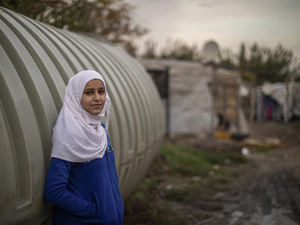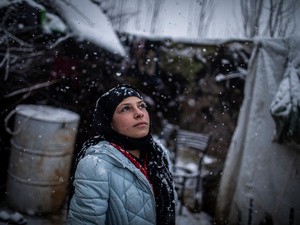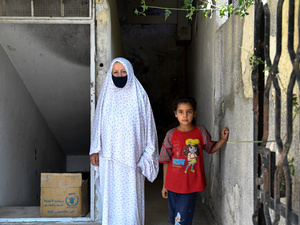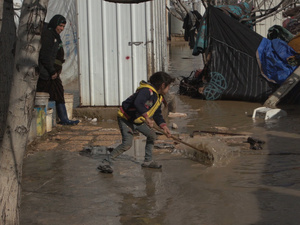Number of Syrian refugees tops 1.5 million mark with many more expected
Number of Syrian refugees tops 1.5 million mark with many more expected

Syrian families continue to flee across borders. This photograph was taken at the Jordan border.© UNHCR/Jared J.Kohler
GENEVA, May 17 (UNHCR) – The UN refugee agency announced on Friday that the number of Syrian civilians who have fled their country to escape conflict has passed the 1.5 million mark. "The Syrian conflict continues to have a devastating impact on the lives of those who are forced to flee," added UNHCR spokesman Dan McNorton in Geneva.
He told journalists in Geneva that the real number was probably much higher, adding that "this is due to concerns that some Syrians have regarding registration."
The widening gap between the needs and resources available is a growing challenge, McNorton stressed. UNHCR has registered close to 1 million refugees since the beginning of the year – this is about 250,000 people each month. Early next month, the UN and NGOs are due to announce a revised funding appeal for the Syria crisis.
"Refugees tell us the increased fighting and changing of control of towns and villages, in particular in conflict areas, results in more and more civilians deciding to leave. Over the past four months we have seen a rapid deterioration when compared to the previous 20 months of this conflict," McNorton said.
Inside Syria, meanwhile, UNHCR continued this week to follow up on the needs and situation of several hundred families displaced in the village of Zamarin, on the outskirts of Tartus, a city on the Mediterranean coast. They fled Banias district in Lattakia governorate, where clashes erupted in early May. Some families found shelter in a mosque and local schools, but the majority have been hosted by families in Zamarin.
These families received UNHCR emergency relief assistance last week, including blankets, mattresses, hygiene kits, children's nappies and sanitary napkins. Many families have reportedly returned to Banias, where children have to take their exams very soon.
The UNHCR aid, part of a UN inter-agency effort, benefitted 3,000 people and was distributed from May 4-11 by the refugee agency's partners. UNHCR has been present in Tartus since early April and is permanently present in five cities – the others are Damascus, Aleppo, Hassakeh and Homs. Overall in Syria, UNHCR's relief assistance has reached 860,000 displaced Syrians since the beginning of the year.
In Lebanon, UNHCR has stepped up its capacity to register refugees. "Every day over 4,200 people approach our offices for registration. In April, over 90,000 refugees were registered in our centres. This is more than a ten-fold increase when compared to the same month in 2012," McNorton noted.
Waiting periods for registration have also decreased with an average waiting time of 16-30 days throughout the country, apart from the south where UNHCR's registration centre has just become operational. But there too, each week the waiting period for refugees is decreasing.
The UNHCR Lebanon office is also reducing the backlog by more than 8,000 individuals per week. UNHCR has opened new registration centres. The agency is using enhanced registration mechanisms, ensuring that individual protection interviews still take place, providing transportation assistance to refugees and expanding the number of shifts.












